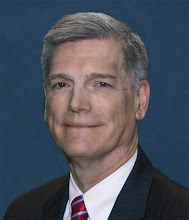 With the predominance of knowledge industries, financial instruments, and labor-intensive services in our economy and news this political season, one might forget about the asset-intensive businesses that drive the heartland. We do not. Our membership is drawn from across the industrial spectrum and the fate of our largest members - utilities, manufacturers, suppliers and vendors, engineering and construction companies among them - depends on the interplay of capital markets; tax, trade and economic policy; and government regulation more than is the case for companies less laden with fixed assets. Thus it is heartening to hear the perspective of someone who understands the challenges of these heavily capitalized companies in today's turbulent times, a perspective that seldom reaches the front pages of The Washington Post or the New York Times or the teleprompters of CNN.
With the predominance of knowledge industries, financial instruments, and labor-intensive services in our economy and news this political season, one might forget about the asset-intensive businesses that drive the heartland. We do not. Our membership is drawn from across the industrial spectrum and the fate of our largest members - utilities, manufacturers, suppliers and vendors, engineering and construction companies among them - depends on the interplay of capital markets; tax, trade and economic policy; and government regulation more than is the case for companies less laden with fixed assets. Thus it is heartening to hear the perspective of someone who understands the challenges of these heavily capitalized companies in today's turbulent times, a perspective that seldom reaches the front pages of The Washington Post or the New York Times or the teleprompters of CNN.This morning, the Wall Street Journal weekend edition published an interview with Fred Smith, CEO of FedEx and a member of the Energy Security Leadership Council. In the interview, Mr. Smith explains the need for changes in corporate tax policy to support rather than punish investment in corporate assets, describes how those investments link to better opportunities for workers and improvements in wages, and discusses the responsibility of corporate boards of directors to oversee managers and give them long-term incentives tied to the fortunes of shareholders.
Mr. Smith also speaks about the importance of energy. With FedEx the second largest consumer of energy in the world (only the U.S. military consumes more), Mr. Smith is keenly interested in energy policy. He believes the U.S. must dramatically expand its domestic energy supply. Asked how we should do this, he said:
"Two things: The first is we should maximize oil production in the United States in every respect. Everything, offshore, Alaska, shale,nonconventional, coal to liquid, gas to liquid, and nuclear. Let the market work. Second, and this is where I am an apostate on the free market, and also where I disagree in the main with, with Boone Pickens. The United States has only one real way to reduce our dependence on foreign petroleum, in terms of reducing demand while we're increasing our domestic supply, and that is to electrify the short haul transportation system, to go to battery powered cars. The technology that brought us laptops and cell phones has reached a point where these lithium ion batteries can now produce cars like the Chevy Volt and the new plug-in Toyota Prius."Interesting - a guy whose business flies airplanes, drives trucks, and employs 290,000 people mentions nuclear. That sounds like the perspective of someone who understands the interrelatedness of our energy needs and the importance of pursuing all options, a perspective we applaud and commend to your reading.

Comments
I'm reminded of the line, "In the long term, we're all dead." The overnight shipping business did not exist on a world-wide scale until Smith invented it. It is hard to imagine that once invented, the business cannot or would not adapt to changing circumstances. Evidence of that is mentioned further along in the WSJ interview, where Smith spoke of experiments with alternative vehicles and admitted the economic results are not what they need to be. By historical measures, we are barely into the acknowledgment stage on climate change and experimentation and the search for solutions. I would give Smith the benefit of the doubt at this juncture and trust that he or his successors at FedEx will, in due course, offer solutions for their long term challenges. If they don't, someone else will. It's the American way.
Of course he mentions nuclear, anyone who understands basic economic theory understands that increases in supplies of a commodity benefits buyers of that commodity. Smith's company is a huge energy purchaser; he SHOULD be in favor of technologies that introduce a huge new supply into the market.
The real challenge for people who want to shift the conversation about energy is to figure out how to reorder Mr. Smith's list so that nuclear is at the top rather that at the bottom.
http://www.timesonline.co.uk/tol/news/environment/article5024190.ece